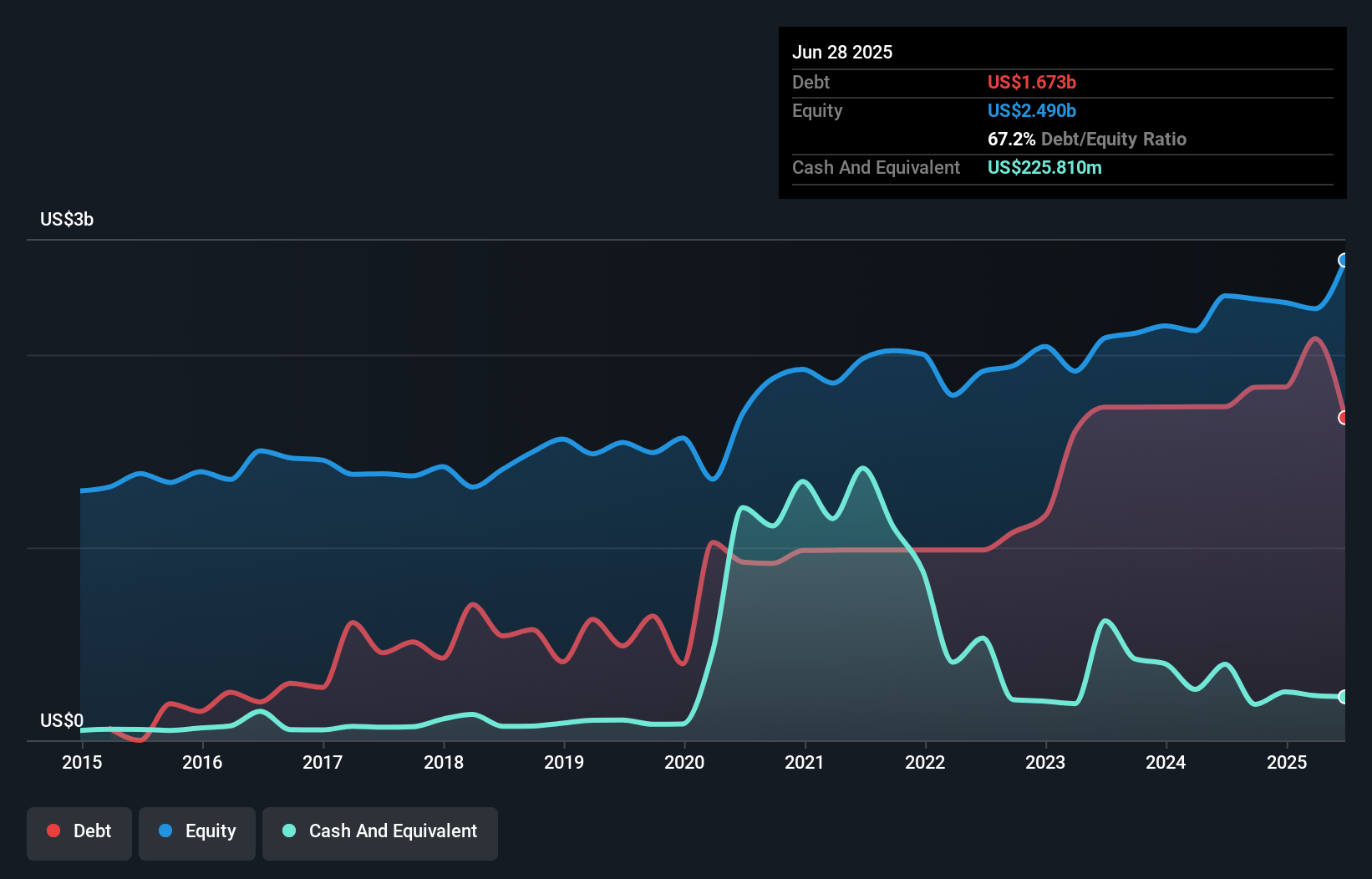The external fund manager backed by Berkshire Hathaway's Charlie Munger, Li Lu, makes no bones about it when he says 'The biggest investment risk is not the volatility of prices, but whether you will suffer a permanent loss of capital.' It's only natural to consider a company's balance sheet when you examine how risky it is, since debt is often involved when a business collapses. We note that Tractor Supply Company (NASDAQ:TSCO) does have debt on its balance sheet. But is this debt a concern to shareholders?
When Is Debt Dangerous?
Debt is a tool to help businesses grow, but if a business is incapable of paying off its lenders, then it exists at their mercy. If things get really bad, the lenders can take control of the business. However, a more usual (but still expensive) situation is where a company must dilute shareholders at a cheap share price simply to get debt under control. Of course, plenty of companies use debt to fund growth, without any negative consequences. The first step when considering a company's debt levels is to consider its cash and debt together.
How Much Debt Does Tractor Supply Carry?
As you can see below, Tractor Supply had US$1.67b of debt, at June 2025, which is about the same as the year before. You can click the chart for greater detail. However, it also had US$225.8m in cash, and so its net debt is US$1.45b.

A Look At Tractor Supply's Liabilities
Zooming in on the latest balance sheet data, we can see that Tractor Supply had liabilities of US$2.76b due within 12 months and liabilities of US$5.31b due beyond that. On the other hand, it had cash of US$225.8m and US$21.6m worth of receivables due within a year. So its liabilities total US$7.82b more than the combination of its cash and short-term receivables.
While this might seem like a lot, it is not so bad since Tractor Supply has a huge market capitalization of US$30.0b, and so it could probably strengthen its balance sheet by raising capital if it needed to. However, it is still worthwhile taking a close look at its ability to pay off debt.
View our latest analysis for Tractor Supply
In order to size up a company's debt relative to its earnings, we calculate its net debt divided by its earnings before interest, tax, depreciation, and amortization (EBITDA) and its earnings before interest and tax (EBIT) divided by its interest expense (its interest cover). The advantage of this approach is that we take into account both the absolute quantum of debt (with net debt to EBITDA) and the actual interest expenses associated with that debt (with its interest cover ratio).
Tractor Supply has a low net debt to EBITDA ratio of only 0.74. And its EBIT easily covers its interest expense, being 21.4 times the size. So we're pretty relaxed about its super-conservative use of debt. While Tractor Supply doesn't seem to have gained much on the EBIT line, at least earnings remain stable for now. There's no doubt that we learn most about debt from the balance sheet. But it is future earnings, more than anything, that will determine Tractor Supply's ability to maintain a healthy balance sheet going forward. So if you're focused on the future you can check out this free report showing analyst profit forecasts.
But our final consideration is also important, because a company cannot pay debt with paper profits; it needs cold hard cash. So it's worth checking how much of that EBIT is backed by free cash flow. Looking at the most recent three years, Tractor Supply recorded free cash flow of 47% of its EBIT, which is weaker than we'd expect. That weak cash conversion makes it more difficult to handle indebtedness.
Our View
On our analysis Tractor Supply's interest cover should signal that it won't have too much trouble with its debt. But the other factors we noted above weren't so encouraging. For example, its EBIT growth rate makes us a little nervous about its debt. When we consider all the elements mentioned above, it seems to us that Tractor Supply is managing its debt quite well. Having said that, the load is sufficiently heavy that we would recommend any shareholders keep a close eye on it. When analysing debt levels, the balance sheet is the obvious place to start. But ultimately, every company can contain risks that exist outside of the balance sheet. For example - Tractor Supply has 1 warning sign we think you should be aware of.
At the end of the day, it's often better to focus on companies that are free from net debt. You can access our special list of such companies (all with a track record of profit growth). It's free.
Valuation is complex, but we're here to simplify it.
Discover if Tractor Supply might be undervalued or overvalued with our detailed analysis, featuring fair value estimates, potential risks, dividends, insider trades, and its financial condition.
Access Free AnalysisHave feedback on this article? Concerned about the content? Get in touch with us directly. Alternatively, email editorial-team (at) simplywallst.com.
This article by Simply Wall St is general in nature. We provide commentary based on historical data and analyst forecasts only using an unbiased methodology and our articles are not intended to be financial advice. It does not constitute a recommendation to buy or sell any stock, and does not take account of your objectives, or your financial situation. We aim to bring you long-term focused analysis driven by fundamental data. Note that our analysis may not factor in the latest price-sensitive company announcements or qualitative material. Simply Wall St has no position in any stocks mentioned.
About NasdaqGS:TSCO
Tractor Supply
Operates as a rural lifestyle retailer in the United States.
Established dividend payer with acceptable track record.
Similar Companies
Market Insights
Community Narratives





